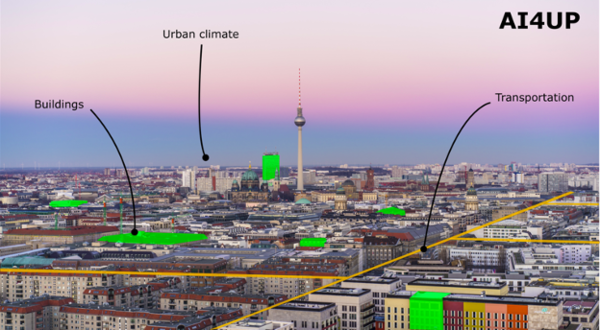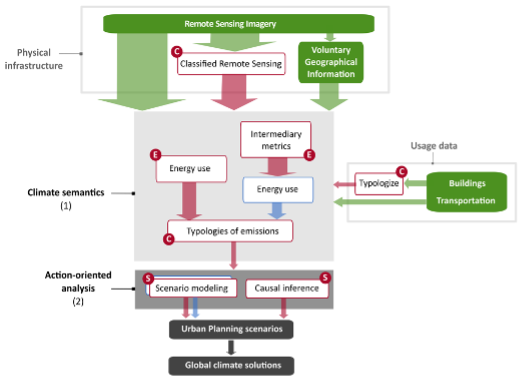Presentation
AI4UP: Artificial Intelligence for low-carbon Urban Planning is a project aiming to use advances in machine learning and geospatial data science to provide novel urban planning solutions helping city mitigate and adapt to climate change. AI4UP is developed by the working group Land Use, Infrastructure, Transport at MCC and the chair of Sustainability Economics of Human Settlements at TU Berlin.
The motivation for AI4UP is the lack spatial granularity and of specific solutions existing in global climate change mitigation scenarios. Local policy makers are often left disoriented on which measures are adequate and impactful, and how everyday decisions related to infrastructure investments or urban planning can be modified to adjust to a low-carbon future. In addition, global climate change mitigation requires solutions that can scale across cities and regions, while most existing research looks at city-specific case studies.
AI4UP aims at developing tools addressing these issues and providing climate solutions at street and building level for municipalities and human settlements. For this, we use geospatial data, such as remote sensing imagery, GPS, government data or volunteer geographic information, which are now available at high-resolution and at large scales. We are applying machine learning to learn features of urban form that are predictive of relevant metrics for urban sustainability. For example, we developed proof-of-concepts that buildings heights or commute distances are related to the specific configurations of neighborhoods and the larger spatial structure of cities.
Our goal is to provide solutions integrating different sectors and relevant dimensions of urban climate change mitigation and adaptation. Our current work focuses on the building and transportation sectors, and on urban heat.
We presented our main architecture in Milojevic-Dupont & Creutzig (2020), presented in the figure below.
Example
To support research in this domain, we are creating an EU-wide building database called EUBUCCO that contains the footprint geometry and key building attributes like building type, height and construction year for more than 200 million buildings. The dataset is generated by aggregating and harmonizing existing open government and OpenStreetMap data, and using machine learning to fill data gaps. It enables us and other researchers for the first time to analyse the built environment with high spatial resolution on a European scale. We utilise the database, for example, to scale existing building energy demand models to investigate how the current building stock in the EU can be retrofitted to achieve decarbonization targets. The EUBUCCO dataset is publicly available and can be downloaded at: https://eubucco.com/
Closely related is another key example of our work, the prediction of building heights (Milojevic-Dupont et al. 2020). In this work, we trained several machine-learning algorithms to learn building heights from 150 features representing several dimensions of urban form (building stock, street network, etc.) engineered with domain knowledge. The results revealed that it is possible to predict building heights with an average error well below the typical floor height across several European countries, demonstrating that urban form data contains useful information to predict important metrics for urban sustainability. For our EUBUCCO database, we build on this approach to infer missing building heights and other attributes.
Team
- Felix Creutzig, PI
- Josefine Hintz, PhD candidate
- Jiawei Hu, PhD candidate
- Nikola Milojevic-Dupont, Postdoc
- Florian Nachtigall, PhD candidate
- Felix Wagner, PhD candidate
- Aicha Zekar, PhD candidate
Publications
Milojevic-Dupont, Nikola, and Felix Creutzig. "Machine learning for geographically differentiated climate change mitigation in urban areas." Sustainable Cities and Society (2020): 102526.
Milojevic-Dupont, Nikola, et al. "Learning from urban form to predict building heights." PLOS ONE 15.12 (2020): e0242010.
Wagner, Felix et al. "Understanding the impact of the built environment on travelled vehicle kilometres in Berlin" Proceedings of the 28th International Seminar of Urban Form (2021).
Rolnick, David, et al. Tackling climate change with machine learning. ACM Computing Surveys (in press)
Creutzig, Felix, et al. "Upscaling urban data science for global climate solutions." Global Sustainability 2 (2019).
Creutzig, Felix, et al. "Leveraging digitalization for sustainability in urban transport." Global Sustainability 2 (2019).







